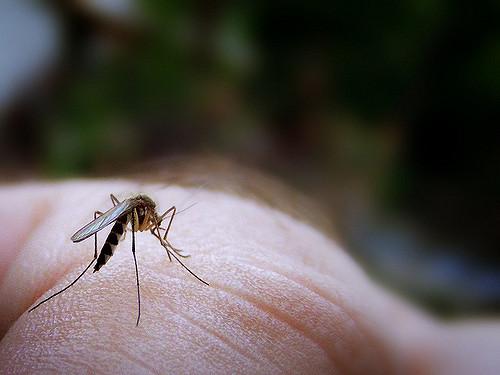A combination of hot weather and heavy rainfall has hit Dane County and other parts of Southern Wisconsin September, creating the perfect environment for pests like mosquitoes.
High rainfall has led to inland flooding from overflow in the rivers and lakes, according to WPR. Mosquitoes breed in standing water, so Madison’s flooded streets haven’t just been roadblocks, they are also bug breeding hotbeds.
Susan Paskewitz, University of Wisconsin entomology professor and insect biology expert, said the city of Madison has been monitoring mosquito traps weekly and saw results ranging from 5,000 to 13,000 mosquitoes per trap.
On Sept. 21, the traps yielded record results: 15,000 mosquitoes were caught during the prior week.
“Typical numbers for this time of season are 20, 50, sometimes 500 at their worst,” Paskewitz said.
She anticipated that even more mosquitoes could come, as there is still standing water from the floods for mosquitoes to lay their eggs, coupled with the fact that this September has been unusually hot.
Jordan Gerth, an expert on Wisconsin and Great Lakes weather said a mid-September cool down is usually what causes mosquito populations to finally decline, but this year the month has been unusually hot due to the active hurricane season.
“Temperature patterns in Wisconsin are guided by tropical cyclones,” Gerth said. “Typhoons in the Pacific and Atlantic extend Wisconsin summers — Hurricane Florence is just one example.”
Wisconsin rainfall was this highest in the country over two weeks in August according to the Post Crescent, which reflects larger trends in rainfall all over the Midwest. In the past 100 years, Minnesota has also seen a sharp increase in mega-rain events, according to the Minnesota Department of Natural Resources, which are characterized by rain totals of six inches or more over 1000 square miles.
These events are accompanied by potentially catastrophic flooding, which has the potential to attract mosquitoes in large droves, Gerth said.
“Even in the weeks of September where no rain occurred, temperatures have still been mild with no decrease in summertime weather,” Gerth said. “Until a complete freeze kills enough mosquitoes so the rest know that it’s time to get ready for winter, adult mosquitoes will keep laying eggs, and new adults will keep hatching.”
Gerth said the temperature will start cooling down within the next couple of weeks.
But the mosquito bloom is still a cause for concern.
Brought on by climate change, warmer temperatures in temperate zones can extend mosquito season beyond what is typical, according to NPR.
Wisconsin Gazette said basic thermodynamics show that with each degree the air increases, 4 percent more water can be held, which means that the large amounts of water being dumped by recent hurricanes are, at the very least, exacerbated by climate change. This link signifies that high levels of mosquitoes that breed in floodwaters are indirectly connected to the changing climate.
Tropical activities like the recent hurricanes are typical during this time of the season, and long-term patterns must be studied to form links to climate change. But if hurricanes become more and more frequent as a result of climate change, then longer summers, heavy rainfall, flooding and more mosquitoes will be in Wisconsin’s forecast, according to NPR.
Mosquito-transmitted diseases are another common worry. According to the Cap Times, there is no risk for diseases like Yellow Fever or Zika in Wisconsin, but there are two species in our state that can carry West Nile virus.
One is called culex tipiens, which can transmit the disease to humans, and the other species is culex restuans, which prefers to feed on birds. The number of culex tipiens in past years has been too low to warrant concern of a West Nile virus threat, but that has changed this year, Paskewitz said.
Paskewitz said they use special traps that the culex species are attracted to in order to gauge the degree of threat.
“There’s more than we’re used to seeing,” Paskewitz said. “We had a lot of West Nile virus in mosquitoes in Milwaukee and Dane County, and we even saw a case [of the disease] in Dane County.”
According to the Madison and Dane County public health website, if numbers were ever high enough to cause concern, the city would treat water on public lands to reduce the mosquito population.
But for now, long sleeves, long pants and EPA-approved bug spray are good for keeping them at bay, Paskewitz said. Heartworm medication is also a must-have for pet dogs, as mosquitoes have been known to transmit diseases to them.


